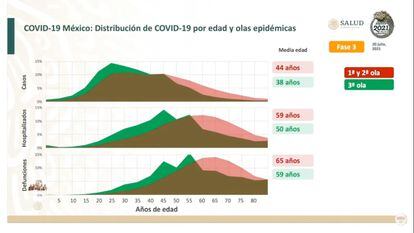Young people and people who have not yet received the vaccine against covid-19 are the protagonists of the third wave of infections in Mexico. The new face of the pandemic worries health authorities, who have seen how the average age of infections has decreased in recent weeks and is now around 38 years, compared to the one that had been registered in the two previous waves, 44 years old. The average age of hospitalizations has also fallen drastically, going from 59 to 50 years, the same case as that of deaths, which went from 65 to 59 years. The myth of the virus that only affected the elderly and with chronic diseases has been dismantled by the data presented this Tuesday by the Government, which rushes the vaccination with the goal against the clock of covering the entire adult population before the end of October."We have already achieved a very important coverage of the population over 50 years old and therefore young people have been transferred," warned the Undersecretary of Health, Hugo López-Gatell.
More information
Mexico City doubles hospitalizations for covid-19 in less than a month
The third wave of infections grows in Mexico
The delta variant takes over Mexico City
"Most of the people with covid at this time are under 50 years of age and the vast majority were not vaccinated, more than 90%," López-Gatell said.
After registering several months with downward infections, the feeling that the country had found the light at the end of the tunnel of the health emergency has faded little by little and the government messages that assured that the pandemic was "tamed" and "controlled They have now taken an increasingly cautious tone.
Despite everything, the health authorities have said that measures to contain the spread of the coronavirus and, in particular, to the delta variant, which is already the predominant one in the capital, the area most affected by the epidemic, will not be hardened. It extends with the forecast of dominating infections in the coming weeks. Salud has ruled out the closure of public spaces, new restrictions on businesses and implementing greater controls at the borders. Contrary to the current of most countries on the continent, Mexico will continue without requesting negative tests or preventing the transit of people who have not been vaccinated, as Europe has done.
The justification is the economic characteristics of the country and the wear and tear after almost a year and a half of the pandemic.
"We certainly have a tired, fatigued society of having these long months of epidemic, what one can ask of society in terms of reduced mobility is not the same today as it was in February 2020," he said. noted López-Gatell.
Health has also made adjustments to the epidemiological traffic light that regulates economic reactivation and mobility, but has not given precise information on the changes or when they will begin to be applied.
Distribution of cases, hospitalizations and deaths from covid-19 by age and epidemic waves.
Delta is at the bottom of the problem. When encountering vaccinated people, who can respond better to covid-19, the virus mutates into stronger versions in order to replicate and reaches people who have not been immunized more virulently. Young people, less exposed in the initial phases of the pandemic, have had to wait longer than their elders to receive a dose, a decision that was reasonable. Protecting the most vulnerable has lowered the rate of mortality in Mexico, the fourth country with the most deaths from covid in the world in absolute terms, according to official data. But new variants of the virus have made it more urgent for vaccination to accelerate, a complex task for an economy that is not in the group of the rich and for a giant of more than 126 million inhabitants.
The pandemic now has another face and, in this new context, vaccines have not arrived fast enough. The point of concern is that in the transition to this last scenario, the population group that has left the most for work and due to the easing of an epidemic that had subsided is today among the most exposed. An article in
Gatopardo
magazine
warns that during the first months of the health crisis the percentage of deaths among people under 40 years old was around 5% and in July it already represented 15% of deaths. More than 38 million inhabitants have received at least one dose of the vaccine, 43% of the population over 18 years of age, according to the Government.
However, there is a gap in the records of almost 20 million doses between the vaccines available and those that have been applied, an issue that has ignited controversy, as the country takes its first steps in immunizing people between the ages of 30 and 39 years old. Only in the border area with the United States have people over 18 been vaccinated, although in Chiapas a policy has been launched to encourage young people, who will receive a dose if they take their family members to be vaccinated.
While waiting for the vaccination to progress, the Government has once again appealed to the responsibility of its citizens, as it did in the first months of the epidemic, especially young people.
Be on the lookout for symptoms, drops in oxygenation, avoid self-medication, and sign up for the vaccine when available.
"It is important that all of you who are young take into account that you too can be affected and affected," López-Gatell insisted.
Subscribe here
to the
newsletter
of EL PAÍS México and receive all the informative keys of the current situation of this country

